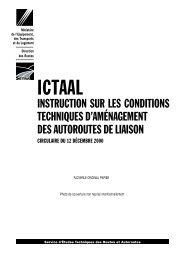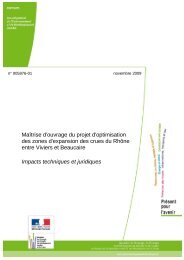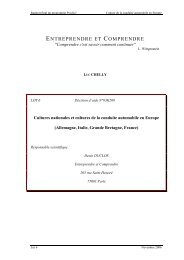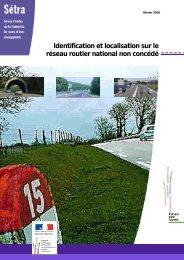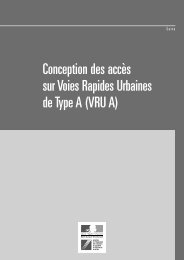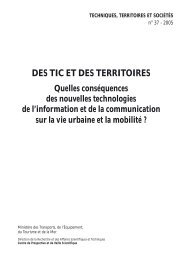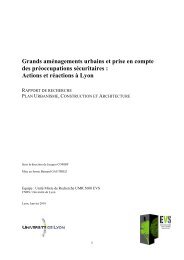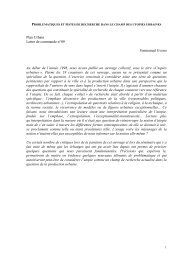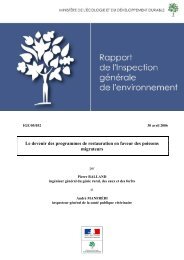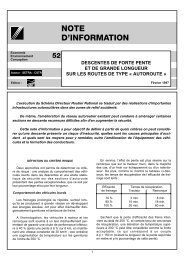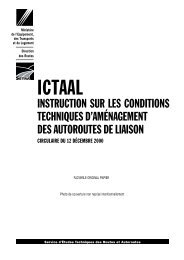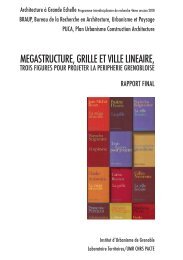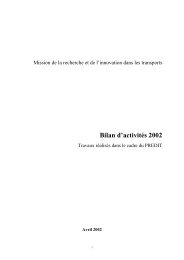Daniel Kaplan - Portail documentaire du Ministère de l'Ecologie
Daniel Kaplan - Portail documentaire du Ministère de l'Ecologie
Daniel Kaplan - Portail documentaire du Ministère de l'Ecologie
You also want an ePaper? Increase the reach of your titles
YUMPU automatically turns print PDFs into web optimized ePapers that Google loves.
THE NETWORK AND THE CITY: URBAN PLACES IN VIRTUAL SPACES<br />
The purpose of this paper is to consi<strong>de</strong>r the role<br />
and significance of information technologies in the<br />
urban experience. The evaluation <strong>de</strong>als with two<br />
main streams: the first explores the representations<br />
of cities on the Internet in the form of “virtual<br />
urbanism”. The particular interest is on assessing the<br />
case of virtual Turku. Relationships have been<br />
drawn between the physical and material urban<br />
representation with its actual buildings, environments<br />
and places, and more abstract i<strong>de</strong>as of image<br />
creation by the city related to the mental i<strong>de</strong>as that<br />
these two aspects create in the mind of an observer.<br />
Secondly, the <strong>de</strong>bate of loss of public space in the<br />
cities caused by high-tech advancements is un<strong>de</strong>r<br />
critical examination. The stress is on evaluating<br />
arguments about the <strong>de</strong>cline of public life in the<br />
urban realm. The connection has been established<br />
between theoretical approaches ranging from<br />
technological <strong>de</strong>terminism, and i<strong>de</strong>as of substitution,<br />
to refusal of techno-boom and other<br />
sceptical approaches. Evaluation of spatial aspects<br />
and experiences created in/by networks, particularly<br />
in the Internet, is inclu<strong>de</strong>d. It is argued that the<br />
Internet creates a crisis of boundaries between the<br />
real and the virtual, and between spaces of near and<br />
distant. The common factor is the usage of the<br />
Internet as a media to awake and stimulate imaginations<br />
in relation to a real world counterpart. This<br />
article conclu<strong>de</strong>s by consi<strong>de</strong>ring the implications of<br />
spatial i<strong>de</strong>as on urban and virtual relations in<br />
contemporary society.<br />
Key words: urban life, virtuality, technological<br />
substitution, information society.<br />
Intro<strong>du</strong>ction<br />
Questions in urban research have always been<br />
connected to the social interaction within and mental<br />
experiencing of urban space. Now, at the beginning<br />
of a new millennium, new technological advancements<br />
have ma<strong>de</strong> possible a new kind of urban<br />
experience that has been <strong>de</strong>scribed as a virtualelectronic-<br />
or cyber-life. A causative factor in this<br />
respect has been the Internet, an expanding entity<br />
with a logarithmic growth rate. Since 1990 contemporary<br />
societal research has paid more and more<br />
Dr. Tommi INKINEN<br />
University of Turku, Department of Geography<br />
attention to this new transformative force that alters<br />
the behavioural patterns of indivi<strong>du</strong>als and also has<br />
implications on the aggregate factors like economic<br />
power and political <strong>de</strong>cision-making. The multitransaction<br />
of voice, moving real-time pictures,<br />
textual and numerical data and their simultaneous<br />
usage has given an enormous boost to this global<br />
information channel. In addition, ol<strong>de</strong>r and more<br />
traditional forms of media, like newspaper, television<br />
and radio have created an extensive hype about their<br />
new partner and companion. Now advertisements<br />
effectively promote i<strong>de</strong>as of virtual tourism and new<br />
opportunities to consume.<br />
There have been several discussions in contemporary<br />
literature concerning issues <strong>de</strong>aling with<br />
urban – electronic relations (e.g. Graham & Marvin<br />
1996; Mitchell 1995; Light 1999). The variety of<br />
argumentation is enormous, but three broad<br />
aggregate types, in a geographical sense, have been<br />
proposed by Graham (1998: 167–180). He argues<br />
that the societal evolution is evi<strong>de</strong>ntly affected by<br />
technological advancements and makes the<br />
distinction between proposed genres into the<br />
following: firstly, the techno-dream of substitution<br />
and transcen<strong>de</strong>nce – the transformation of life<br />
in/onto the net resulting in spaces/places and their<br />
dynamics being substituted and replaced by new<br />
technological innovations. Secondly, the recognition<br />
of parallel co-evolution – the notion of that the<br />
societal and technological evolution are tightly<br />
bound together. Finally, the recombination<br />
perspective – the acknowledgement of relational<br />
interactions between human actors and the<br />
contextual nature of man-computer relations (see<br />
also Law and Hassard 1999: 1–16; Bingham 1996) in<br />
which the focus is on assessing the diversity of human<br />
interactions and their differences through different<br />
sets of human actor–technology recombinations.<br />
In this paper I’m going to explore two essential<br />
questions. Firstly, to evaluate the virtual tourism by<br />
using Turku as a case study, and secondly, to assess<br />
the capability of these technologies to substitute<br />
public life, an argument that has been analysed e.g.<br />
by Light (1999) and Crang (2000). The connection<br />
is drawn to actual human experiences in the form of<br />
an empirical slice. The two questions are interwoven<br />
and therefore strict separation of the issues is<br />
impossible. The themes are synthesised together<br />
and a critical approach will be proposed.<br />
265



